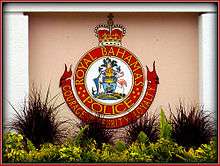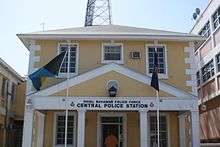Royal Bahamas Police Force
The Royal Bahamas Police Force is the national law enforcement agency of the Commonwealth of The Bahamas. It operates within the portfolio of the Ministry of National Security. The police force was established on 1 March 1840. The Force is headquartered on East Street Hill in Nassau, Bahamas.

History

From the early eighteenth century to the later part of the nineteenth century, the development of policing generally followed the pattern of policing in the United Kingdom of Great Britain and Ireland. During the first half of this period, men were appointed as constables to assist in the enforcement of government rules and regulations, and the apprehension of offenders. A Night Guard was also assigned to protect the town of Nassau, capital of the British Crown Colony of the Bahamas, during the night. As early as 1729, there was a constable in New Providence. However, his duties seem not to have been as broad and well defined as the police constable of today. This constable was attached to the local Magistrate, Justices of the Peace and several other Government officials.
In 1799, an Act of the General Assembly, now called the Parliament of the Bahamas, declared that all constables would have the same powers as their counterparts in Great Britain. They were then allowed to arrest on suspicion of crime as opposed to only after the crime had been committed. In 1827, the General Assembly stipulated their mode of appointment. During this period, only one constable was appointed to serve at a time in each district. These appointments were made by the serving magistrate with the assistance of two justices of the peace.
As time passed and crime increased, a small number of constables were appointed to serve at the same time. However, they were never organised as a formal police force. Each was responsible to the Magistrate in a particular district. This system of constables has evolved into the currently used district and local constables.
During the early years of British colonial rule, slaves made up the majority of the population in the Bahamas. The little policing needed was done by the free population with the help of Constables, Magistrates, and Justices of the Peace. Any slave rebellion or potential slave rebellion was kept in check by the local detachment of British soldiers and the slave owners.
Prior to the abolition of slavery by Act of the British Parliament in 1834, there was a system of night patrols in New Providence called the Night Guard. The men forming this guard were not constables, but were also supervised by the local Magistrate. Their duties were primarily to protect the homes and businesses of the free population at night. In addition, the West India Regiment was stationed in Nassau to take care of any serious breach of peace throughout The Bahamas. These men were trained soldiers recruited from different ethnic groups in Africa and the Caribbean. They lived in barracks in isolation from the populations to ensure their loyalty in the event of local slave rebellions. In addition, their duties also included the protection of the Islands from foreign invaders. At that time, the barracks was situated on the site where the Hilton British Colonial Hotel currently stands.
The majority of the Family Islands which make up The Bahamas were largely neglected as far as law enforcement was concerned, as crime in these areas was almost non-existent. Please visit http://www.royalbahamaspolice.org to learn more about the Police Force and its development.[1][2]
Structure
The Royal Bahamas Police Force is headed by Paul Rolle the Commissioner of Police who is supported in his role by one deputy commissioner four assistant commissioners and one acting assistant commissioner. The headquarters of the police service is located in Nassau, New Providence. The rank structure is similar to that of the United Kingdom's Scotland Yard usage: constable; corporal; sergeant; inspector; assistant superintendent; superintendent; chief superintendent; assistant commissioner; deputy commissioner; and commissioner. There are just over 3,000 members on the force.[3]
Ranking system
| Position |
|---|
| Commissioner |
| Deputy commissioner |
| Assistant Commissioner |
| Chief Superintendent |
| Superintendent |
| Assistant Superintendent |
| Inspector |
| Sergeant |
| Corporal |
| Constable |
Commissioner
The Commissioner is the highest-ranking officer within the police force, superseded only by the Minister of National Security. His responsibilities include ensuring accountability and order, and the guidance and control of all officers and volunteers associated with the force. The current Commissioner of Police is Mr. Paul Rolle (2020–present).
Organisation

The force is divided into three sections: The New Providence District, Grand Bahama District and the Family Islands District. Each district is headed by an Assistant Commissioner. The police service is divided into several different branches, including:[4]
- Air Wing
- Central Detective Unit (CDU)
- Commercial Crime Section
- Community Policing/Community Relations Unit
- Complaints and Discipline
- Crime Scene Investigation Unit/Scenes of Crime Office
- Criminal Records Office
- Divisional Detective Units
- Drug Enforcement Unit
- Fire Branch
- Firearms Tracing and Investigation Unit
- Flying Squad
- Forensics
- Gang Intervention Unit
- Harbour Patrol
- Homicide Squad
- Interpol
- Internal Security Division
- Missing Persons Investigation Unit
- Mobile Patrol Division
- Police Reserve
- Research and Planning
- Security and Intelligence Branch – Special Branch
- Selective Enforcement Team
- Serious Crime Section
- Stolen Vehicles Task Force
- Technology Crime Investigation Unit
- Traffic Division
Senior Executive Leadership Team
The Senior Executive Leadership Team (SELT) is a group of senior officers who guide and control the activities of the Royal Bahamas Police Force. It is led by the commissioner, supported by a deputy commissioner, four assistant commissioners and one acting assistant commissioner:[5] They are
Paul Rolle - Commissioner of Police[6]
Ismella Davis-Delancey - Deputy Commissioner of Police[7]
Ashton Greenslade - Assistant Commissioner of Police (Grand Bahama & the Northern Bahamas District inclusive of Abaco and Bimini)[8]
Loretta Mackey - Assistant Commissioner of Police (Family Islands District)[9]
Craig Stubbs - Assistant Commissioner of Police (Public Safety & Operational Support)[10]
Solomon Cash - Assistant Commissioner of Police (Crime Management & Criminal Investigations)[11]
Kirkwood Andrews - Acting Assistant Commissioner of Police (Management Services & Public Affairs)[12]
Programs
- The Cadet Corps is a program that allows aspiring local youth who are not of the proper age requirement to receive partial training and experience situations undertaken by officers. The program began in 1969 and to gain entrance to the program an eight-week training course must be taken at the headquarters in Nassau. Once the course is completed, a rank of police cadet is earned. These cadets wear casual (depot) dress, distinguished by a slimmer stripe along each side of the regulation pants. They also wear a tag (that includes their name and cadet number) above the right pocket of the shirt.[13]
- The National Crime Prevention Office is an initiative undertaken on 1 February 2010 as part of former Commissioner Greenslade's plan to reduce crime in The Bahamas through the education of and collaboration with the public. The stated mission of the office is to:[14]
- Raise the level of public awareness and concern about crime
- Encourage self-help in crime prevention
- Examine, develop and recommend crime prevention measures suitable to the public
- Coordinate efforts of organisations in crime prevention
Activities
Operation Rapid Strike
Operation Rapid Strike is a project launched on 19 January 2011 at 5:00 pm by Commissioner Ellison Greenslade of the Royal Bahamas Police Force. The mandate of this operation is to "restore peace and civility to our communities". The stated aims of the project is to hunt persons involved in an array of crimes including murder, armed robberies, stabbings, break-ins, firearms related charges, etc. The operation is led by Senior ranking officers such as Superintendents. Other ranks inside the operation include inspectors, supervisory officers and junior officers. Some equipment used by the members of the operation include two thirty two seats buses provided by the Government of the Bahamas.[15]
See also
- Royal Bahamas Defence Force
- Government of The Bahamas
References
- "Police Force Historical Overview". Retrieved 9 March 2011.
- "The Formation of the Police Force". pp. 1–3. Retrieved 9 March 2011.
- "Organization of The Royal Bahamas Police Force". Retrieved 9 March 2011.
- "Royal Bahamas Police Force Organisational Chart" (PDF). 4 January 2010. Archived from the original (PDF) on 27 July 2011. Retrieved 9 March 2011.
- "The Senior Executive Leadership Team (SELT)". Royal Bahamas Police. Retrieved 7 June 2020.
- "Paul Rolle- RBPF Senior Executive Leadership Team". www.royalbahamaspolice.org. Retrieved 8 June 2020.
- "- RBPF Senior Executive Leadership Team". www.royalbahamaspolice.org. Retrieved 8 June 2020.
- "Ashton Greenslade- RBPF Senior Executive Leadership Team". www.royalbahamaspolice.org. Retrieved 8 June 2020.
- "Loretta Mackey- RBPF Senior Executive Leadership Team". www.royalbahamaspolice.org. Retrieved 8 June 2020.
- "Craig Stubbs- RBPF Senior Executive Leadership Team". www.royalbahamaspolice.org. Retrieved 8 June 2020.
- "Solomon Cash- RBPF Senior Executive Leadership Team". www.royalbahamaspolice.org. Retrieved 8 June 2020.
- "Kirkwood Andrews- RBPF Senior Executive Leadership Team". www.royalbahamaspolice.org. Retrieved 8 June 2020.
- "History of the Cadet Corps programme". Retrieved 9 March 2011.
- "National Crime Prevention Office – RBPF". Retrieved 9 March 2011.
- Royal Bahamas Police Force Public Affairs Section (19 January 2011). "Commissioner's Corner". Archived from the original on 27 July 2011. Retrieved 8 March 2011.
External links
- Official website commissioner
.svg.png)